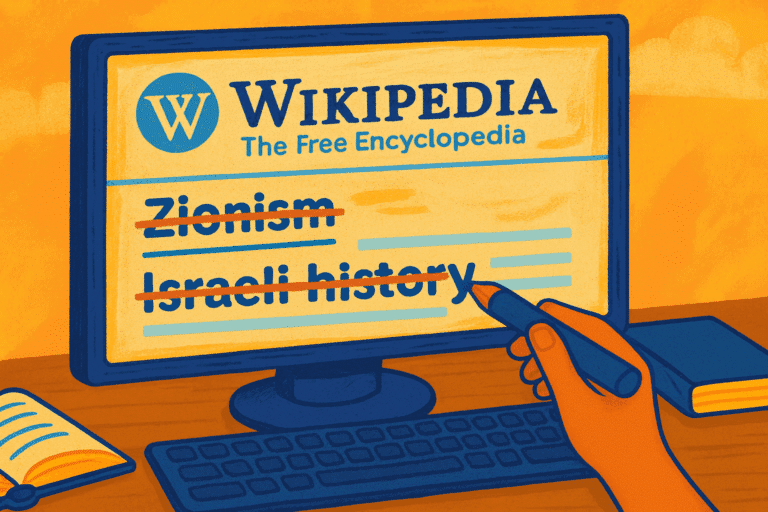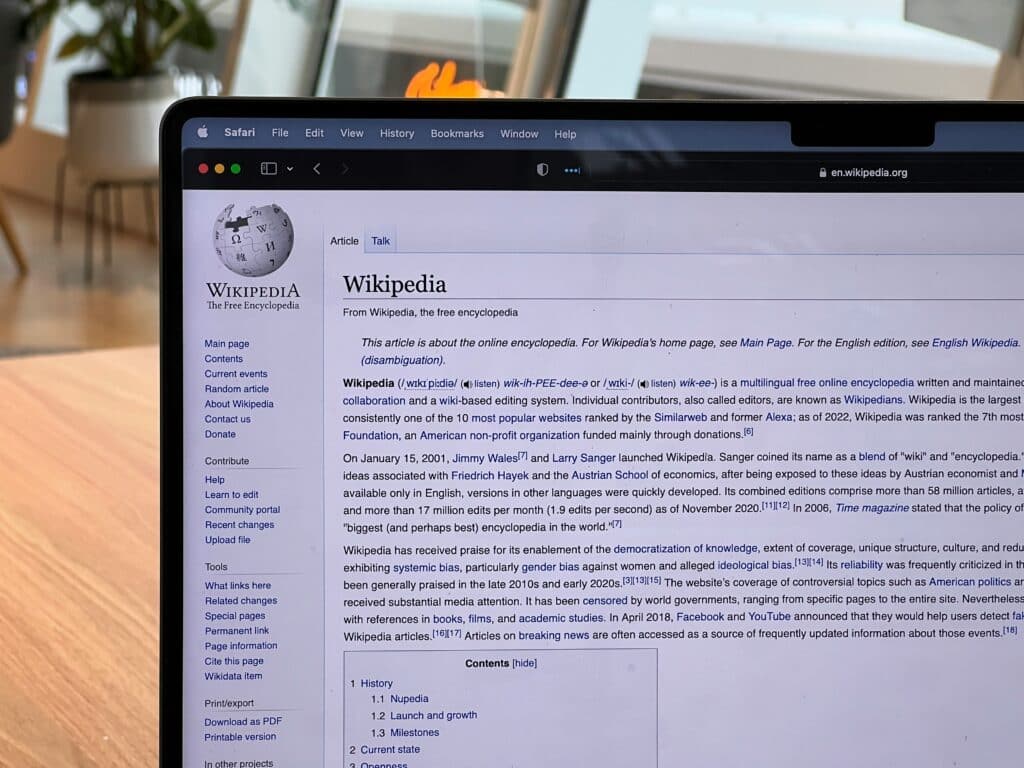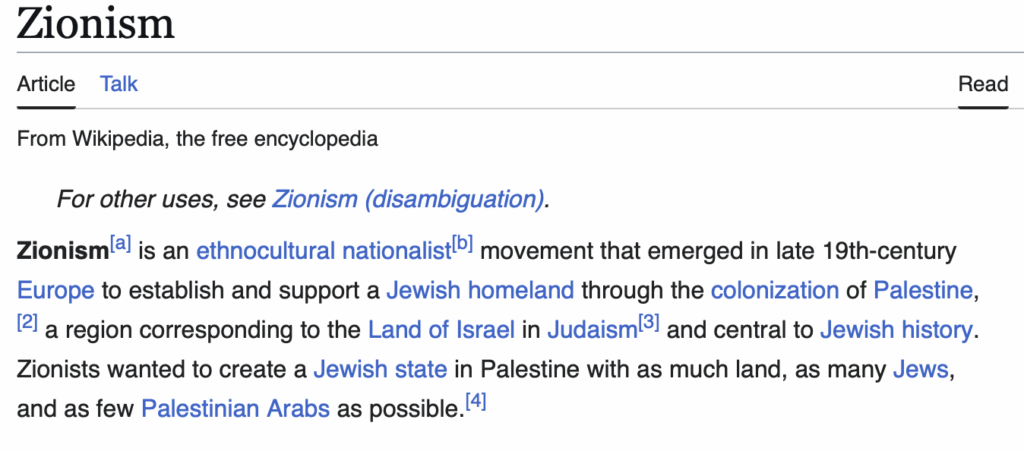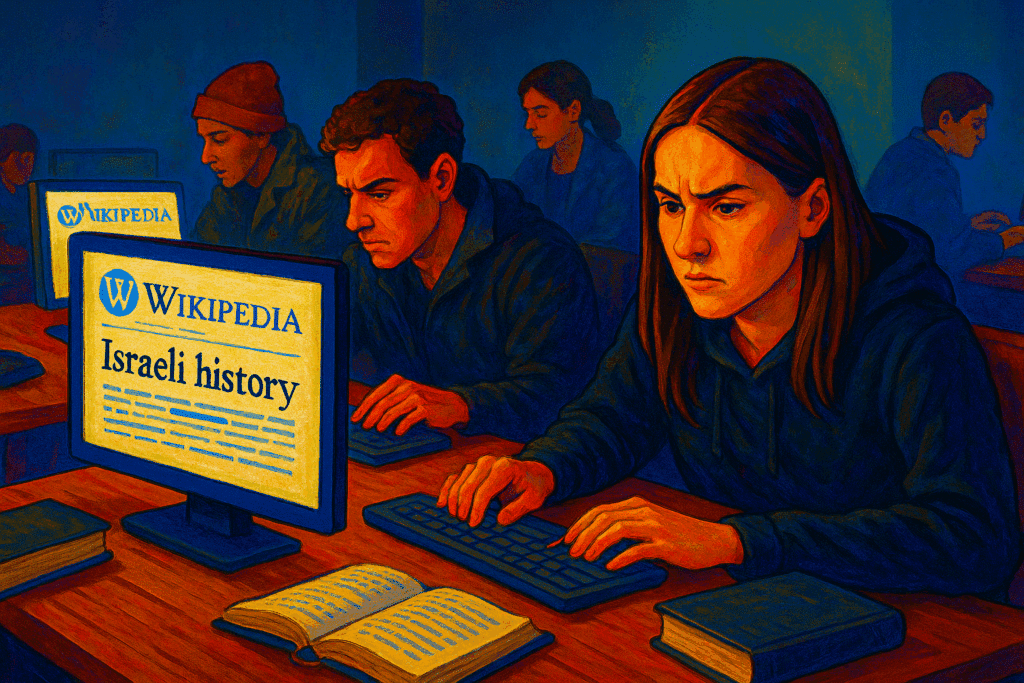
If you’ve ever Googled anything about Jewish history, Zionism, or the Israeli-Palestinian conflict, chances are one of your first stops was Wikipedia. The site isn’t just another online resource; with over 15 billion page views per month, it’s become the default reference for nearly everything — from personal research to school assignments to media coverage.
But what happens when that reference point is deliberately manipulated?
Over the past year, activists have mounted a coordinated campaign to reshape how millions of readers understand the Jewish story, from ancient history to modern Zionism to the Israel-Hamas war. They have removed references to Hamas’ antisemitic charter, reframed Zionism as racism and colonialism, and systematically pushed fringe narratives into the mainstream.
They’ve rewritten the narrative around the expulsion of Palestinians, erased records of suicide bombings to portray Palestinians as more innocent, and revised articles on ancient history to downplay or omit the Jewish people’s presence and historical connection to the land.

The issue isn’t just the edits themselves. It’s that Wikipedia’s own systems, which rely on unpaid volunteer labor, minimal oversight, and a confusing governance structure, have no reliable way to stop this kind of coordinated manipulation.
This isn’t an obscure internet issue. Wikipedia’s content shapes Google search results and powers knowledge panels (the summary boxes that appear at the top or side of your screen) for countless search terms on a wide range of topics, including “Zionism.” It also influences what’s considered “neutral” information across academia, government, social media, and newsrooms.
When Wikipedia gets Jewish history wrong, the whole world does.
So how exactly did activists hijack Wikipedia’s coverage of Jews, Israel, and antisemitism — and what does that mean for the future of truth online?
Let’s unpack it.
How Wikipedia actually works and why it’s so vulnerable
At first glance, Wikipedia looks like the internet’s ultimate democracy. Anyone can edit nearly any article at any time. Its open model invites collaboration and constant improvement… or so the theory goes.
In reality, Wikipedia is run by a relatively small group of highly active editors who dominate entire topic areas. These core contributors are enthusiastic, but often bring ideological zeal to the table instead of the neutral point of view that Wikipedia claims to uphold. They also frequently lack deep subject matter expertise. Many of these editors frequently manipulate and weaponize academic citations to fit their agendas, giving fringe ideas the appearance of scholarly legitimacy. While Wikipedia claims to value “neutrality,” that neutrality is often shaped by whoever controls the editing process for a given subject.

Administrators and arbitrators — Wikipedia’s closest equivalents to moderators or judges — are unpaid volunteers elected by other editors. Crucially, there is no requirement that admins have expertise in the subjects they oversee, even on complex or contentious topics like the Israeli-Palestinian conflict or Jewish history. Their authority is granted primarily through demonstrated familiarity with Wikipedia’s internal policies and social norms, not on any outside credentials. That means major editorial decisions often come down to procedural gamesmanship rather than informed judgment.
This setup can create serious vulnerabilities. Editors with coordinated agendas can influence content by outlasting or overwhelming opposition in what are known as “edit wars.” When conflicts escalate, the Arbitration Committee (ArbCom) is supposed to step in as a kind of Supreme Court. But it has just a handful of active volunteers, months-long backlogs, and a limited appetite for policing content disputes.
Meanwhile, the Wikimedia Foundation — the nonprofit organization that oversees Wikipedia — explicitly avoids editorial involvement except in cases of legal liability. It operates more like a constitutional monarchy: the Foundation is a largely symbolic sovereign, while the real power rests with the self-governing volunteer editors.
This decentralized governance means Wikipedia depends on goodwill, expertise, and transparency to function. But when it comes to politically charged topics, those qualities are often in short supply.
In the case of Israel and Jewish history, activists with sophisticated coordination and strategic know-how have ruthlessly exploited the system’s weaknesses.

A coordinated campaign to rewrite Israel and Jewish history on Wikipedia
Since at least 2022, and with increased intensity after the Oct. 7, 2023 Hamas terror attacks, a group of roughly 40 editors has worked systematically to reshape Wikipedia’s coverage of Israel, Zionism, Jewish history, and related topics.
This wasn’t a series of isolated edits. It was a full-scale information operation, targeting dozens of pages, including “Zionism,” the “History of Israel,” biographies of Jewish figures, and articles about terrorist organizations.
For example, the 1988 Hamas Charter, which explicitly calls for the destruction of Israel and the killing of Jews, was scrubbed or downplayed in key articles. The page on Amin al-Husseini, the Palestinian leader who met with Hitler, was edited to remove or bury photographic evidence of this well-documented historical fact.
More alarmingly, some edits softened or sanitized descriptions of Hamas and Hezbollah, questioned their terrorist designations, and whitewashed their violent histories.
Behind the scenes, a group calling itself Tech for Palestine (TFP) coordinated many of these edits off-platform. Operating through a private Discord server, TFP used job boards, task tracking tools, and even “office hours,” to assign Wikipedia edits tasks like a political campaign.
TFP even tried to pressure British politicians by manipulating their Wikipedia pages ahead of elections in the United Kingdom. Once exposed by investigative reporting, the group deleted its logs, shut down the Discord server, and attempted to cover its tracks — but the damage had already been done to over 100 articles.
This isn’t Wikipedia malfunctioning; it’s Wikipedia working exactly as designed, and being exploited by those who know how to weaponize its vulnerabilities.

What the edits actually changed
The activists didn’t just make minor tweaks to wording. Their campaign fundamentally altered how Wikipedia presents Jewish and Israeli history. Here are some of the most significant changes:
- Redefining Zionism: Articles reframed Zionism from a national liberation movement into a form of settler colonialism or racial supremacy. Language that was once confined to activist academic circles has been pushed into one of the internet’s most-read encyclopedia pages (See the current Zionism article for context).
- Removing ancient Jewish history: References to the ancient Jewish presence in Israel were minimized or deleted in many articles, downplaying Jewish peoplehood and national identity in favor of more politically convenient narratives.
- Whitewashing Iran’s record: Pages covering Iran’s regime were edited to remove references to Holocaust denial, antisemitism, and human rights abuses. The result is a sanitized record of one of the world’s most hostile governments toward Jews and Israel, and a leading state sponsor of terror.
- Softening descriptions of Hamas and Hezbollah: Their terrorist designations were questioned or removed, and historical evidence of violence was softened or erased. Editors also rewrote the narrative on the expulsion of Palestinians and removed listings of suicide attacks to present Palestinians in a more innocent light.
- Freezing debate through a moratorium: In an unprecedented move, a Wikipedia admin imposed a year-long moratorium on editing a disputed section about Zionism. This meant that no one, regardless of sourcing or new evidence, could propose changes. The biased language was effectively locked in as the “truth.” Veteran editors say such moratoriums are virtually unheard of in content disputes, highlighting just how broken Wikipedia’s internal processes have become.
A system that can’t fix itself
Wikipedia isn’t just vulnerable to manipulation; it has no effective mechanism to respond when it happens.
The Arbitration Committee serves as the platform’s Supreme Court but is hampered by its tiny volunteer base, extensive case backlog, and lack of advanced tracking tools to detect coordinated abuse. Its decisions often focus on banning individual users rather than addressing systemic bias or organized editing campaigns.

Core Wikipedia policies, including the requirement for a Neutral Point of View (NPOV), discouragement of coordinated editing (“meatpuppetry”), and prohibition of canvassing, are routinely violated on Israel-related pages. Enforcement of these policies are rare, inconsistent, and often influenced by politics.
As one longtime insider described it, Wikipedia has become a “barn fire,” a platform run by obsessive hobbyists, ideologically-driven editors, and moderators who either ignore or enable the very problems they’re supposed to prevent.
Attempts to bring in balanced, well-trained editors have mostly failed. Newcomers are often discouraged or overwhelmed by entrenched groups, while reform efforts are treated like constitutional amendments — possible in theory, but nearly impossible in practice.
Wikipedia, Google, and the pipeline of misinformation
It would be bad enough if these distortions stayed on Wikipedia. But they don’t.
Google heavily relies on Wikipedia for its top search results and Knowledge Panels — the summary boxes that appear on the right side of search results. of the screen when you search for a person, place, or concept. These panels offer a quick snapshot of information, often appearing above all other sources, and are widely viewed as authoritative.
Studies estimate that Wikipedia powers more than 60% of these panels. This creates a dangerous feedback loop: Biased Wikipedia edits shape what billions of people see when they search terms like “Zionism,” “Israel,” “occupation,” or “Gaza.”
Google’s 2012 decision to cancel its own competitor project, Knol, and rely entirely on Wikipedia further entrenches this dependency and increases Wikipedia’s influence even further.
Worse still, generative AI tools like Google Gemini and Microsoft Copilot pull data directly from Wikipedia when summarizing complex topics. This means misinformation is not only available but actively amplified by emerging technologies.

Why this should matter to everyone
If you care about history, truth, or the ability to have informed debate, what’s happening on Wikipedia should deeply concern you, especially if you care about how the Jewish story is told.
Wikipedia shapes how the world understands Zionism, Israel, and Jewish identity. It influences students, journalists, algorithms, and even policymakers.
When photos of Amin al-Husseini meeting with Nazis are scrubbed, when Jewish indigeneity is erased, or when antisemitic terror groups are given the benefit of the doubt, this isn’t just sloppy editing. It’s historical erasure. It distorts the Jewish story, reframes antisemitism as legitimate resistance, and rewrites reality under the guise of neutrality.
This is not harmless internet bias. It is deliberate, widespread disinformation, designed to legitimize antisemitism and delegitimize Jewish presence in their indigenous homeland.
The fight for accuracy isn’t over
Some activists and watchdog groups are pushing back. Some editors involved in coordinated manipulation have been banned. Tech for Palestine shut down its Discord server after exposure.
Reports by the Anti-Defamation League, Jewish Journal, and others have helped raise public awareness.
However, reforming Wikipedia from within looks increasingly unlikely. The platform’s decentralized volunteer model and minimal oversight make systemic change difficult, especially in the face of well-organized campaigns.
Much of the power to address this problem lies with platforms like Google, which amplify Wikipedia content extensively. Experts and activists are calling for Google to stop treating Wikipedia as a primary source for contentious topics like Israel and antisemitism. Some are petitioning Google to sever Wikipedia as a source in Knowledge Panels until proper safeguards and oversight mechanisms are established.

Others argue for creating redundant, auditable systems to monitor and verify information on contentious topics (CTOP). At a minimum, CTOP Wikipedia articles should be removed from first-page search results on major search engines until their neutrality can be independently verified.
Google shareholders must recognize the liability risks tied to Wikipedia’s exploitation for antisemitism weaponization. Beyond Google, there are calls to engage other tech giants like Yahoo and Microsoft to deprioritize Wikipedia in their search algorithms or, at the very least, increase transparency and accountability around how its content is sourced.
Most importantly, the public needs to understand Wikipedia’s structural fragility and how easily it can be hijacked by ideological actors. A crucial part of the response is education, exposing how the platform’s exploitation to rewrite history, deny atrocities, and invert narratives is key to mobilizing broader pressure for reform.
Wikipedia is one of the most powerful information platforms on Earth. Yet its systems were never designed to handle the ideological warfare now playing out on its pages. Just a few hundred anonymous editors are deciding what billions of people read online.
Without greater accountability, real oversight, and widespread awareness, the digital rewriting of history will continue unchecked. And this problem will not stop with Israel.
Originally Published Aug 4, 2025 09:15AM EDT
